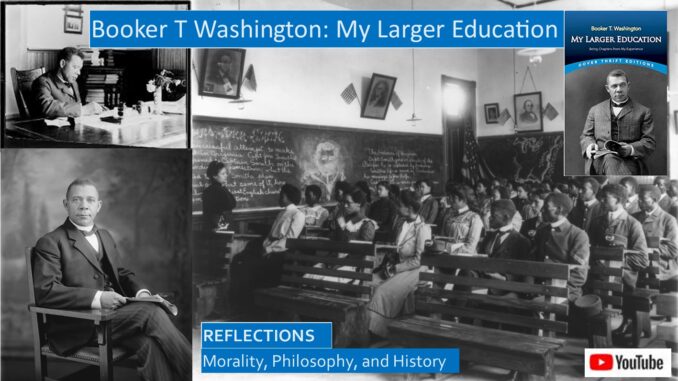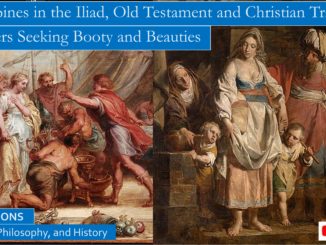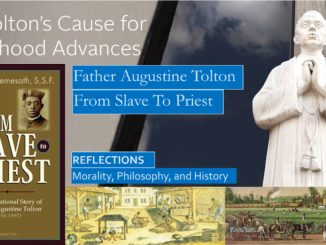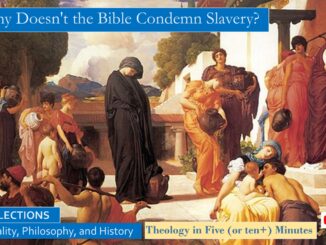
Why should we reflect on Booker T Washington’s second autobiography, My Larger Education?
What were his memories as a slave boy before Emancipation?
Was Booker T Washington too accommodating to white sensibilities? Why didn’t he strongly condemn lynchings and other injustices that Negroes suffered?
What were his opinions of Frederick Douglass and WEB du Bois?
What were the challenges facing black educators?
YouTube video: https://youtu.be/GMPiAubVMfM
Script for this video, with more Amazon book links: https://www.slideshare.net/BruceStrom1/booker-t-washington-my-larger-education-later-autobiography
SUMMARY, THREE GENERATIONS OF BLACK LEADERS
Booker T Washington was the leading second-generation black leader:
- Frederick Douglass, a first-generation black leader, was born a slave in 1818, was quite a rebellious slave, who escaped from slavery in the 1830’s, becoming a renown abolitionist orator, best-selling author, and civil rights activist.
- Booker T Washington was born a slave in 1856 and was emancipated at the end of the Civil War. After earning a college degree, he founded the Tuskegee Institute in Alabama, raising money and support from leading white businessmen and philanthropists for black colleges.
- WEB Du Bois, a third-generation black leader, was born free in Massachusetts in 1868, shortly after the Civil War, but chose to attend college in the Deep South. He was a sociology professor, studying and writing about the status of blacks, and was co-founder of the NAACP, becoming the first editor of the organization’s Crisis Magazine, gaining national recognition for the civil rights movement.
We reviewed a summary of the lives of these three generations of black leaders, plus a history of slavery and slave revolts preceding the abolitionist movement of the 1830’s.
Like Frederick Douglass, Booker T Washington was born a field slave, the family lived in a one-room cabin, everyone sleeping on the floor. He was born in a plantation in southwest Virginia, his family was not broken up, as were many families in Frederick Douglass’ autobiography. Neither knew who their white fathers were. Unending toil, dawn to dusk, was their life, the life of a slave, until his family was emancipated at the end of the Civil War.
His second autobiography, My Further Education, adds details and commentary to his life events described in Up From Slavery.
Main Life Events of Booker T Washington:
- 1856: Born into slavery.
- 1865: Emancipated at the end of the Civil War.
- 1875: Graduated from Hampton University with honors.
- 1877: Reconstruction ended, Jim Crow Redemption Era begins, and the rise of the Ku Klux Klan.
- 1881: Founded the Tuskegee Institute in Macon County, Alabama
- Raised funds from leading white businessmen and philanthropists, including Andrew Carnegie
- 1895: Delivered Atlanta Exposition Speech, the Atlanta Compromise
How does Booker T Washington begin his second autobiography?
“It has been my fortune to be associated with a problem, a hard, perplexing, but important problem. I looked upon this fact as a great misfortune. It seemed to me a great hardship that I was born poor, and it seemed an even greater hardship that I should have been born a Negro.”
Booker T Washington continues: “Paradoxical as it may seem, the difficulties that the Negro has met since Emancipation have, in my opinion, not always but on the whole, helped him more than they have hindered him.” Horatio Alger, pull yourself up by your bootstraps, and work really hard.
“Experience has taught me, in fact, that no man should be pitied because, every day in his life, he faces a hard, stubborn problem, but rather that it is the man who has no problem to solve, no hardships to face, who is to be pitied.”[1]
Where Booker T Washington sees lemonade, WEB Du Bois smells lemons. WEB Dubois coined the term double-consciousness that has been used by American sociologists ever since. “It is a peculiar sensation, this double-consciousness (of blacks), this sense of always looking at one’s self through the eyes of others, of measuring one’s soul by the type of a world that looks on in amused contempt and pity. One ever feels his two-ness, one American, another a Negro, two souls, two thoughts, two unreconciled strivings; two warring ideals in one dark body, whose dogged strength alone keeps it from being torn asunder.” [2]
GROWING UP AS A SLAVE
Both Frederick Douglass and Booker T Washington describe what it was like growing up as a slave. Their experiences under slavery were similar, but their perspectives differed greatly.
Frederick Douglass describes how the slave children were fed their meager ration of mush, which was “coarse corn meal. It was put into a large wooden tray or trough and set down upon the ground. The children were called, like so many pigs they would come and devour the mush.” “The child that ate fastest got most, he that was strongest got the best place; and few left the trough satisfied.”[3]
Somehow, Booker T Washington spins his experience as a slave boy as something he remembers with fondness. He tells how his mother had to get up so early to work in the fields that he was on his own to find breakfast.
Booker fondly remembers, “In those days it was the custom of the plantation to boil the Indian corn that was fed to the cows and pigs. At times, when I had failed to get any other breakfast, I used to go to the places where the cows and pigs were fed and make my breakfast off this boiled corn, or else go to the place where they were boiling the corn” to feed to the barnyard animals.[4]
Booker says though some may feel this “was a pretty bad way to get one’s food,” he remembers how delicious hard-boiled corn was, and today he smiles and says, “I never pass a pot of boiled corn without yielding to the temptation to eat a few grains.” He was not an Uncle Tom’s Cabin slave; he was a happy slave.
Booker T Washington was born four decades after Frederick Douglass, they did meet several times, perhaps they corresponded, and Tuskegee Institute was honored to invite Frederick Douglass to be the main speaker at commencement and other occasions. He offers a mild criticism, he stated that “the long and bitter political struggle in which he had engaged against slavery had not prepared Douglass to take up the equally difficult task of fitting the Negro for the opportunities and responsibilities of freedom.”[5] But then Frederick Douglass was an orator, author, and activist, he was not an educator.
But WEB Du Bois was more of a contrarian than even Frederick Douglass, and he was quite critical publicly of how Booker T Washington soft-pedaled civil rights issues, perhaps he was too personal in his criticisms. Booker T Washington was more diplomatic, in part because of his fund-raising responsibilities for Tuskegee, which meant he was hostage to white opinion. He feared if his comments were too controversial, that this would dry up his funding dramatically. But being accommodating, trying to be conciliatory rather than confrontational, was part of his personality. In his slave autobiography, Up From Slavery, when recounting his teenage years, most of which he spent as a slave, he only attached names to those who treated him right, those who didn’t were nameless.
In both of his autobiographies, Booker T Washington doesn’t even mention WEB Du Bois’ name. This was likely intentional; he makes it a point to praise another white co-founder of the NAACP, Oswald Villard, grandson of the abolitionist William Lloyd Garrison. Booker T Washington then sings praises of the nascent NAACP as a “national vigilance committee, watching over and guarding the rights and interests of the race, seeking through the courts, through legislation and other means, to redress the wrongs suffered by the Negro race.”[6]
In both autobiographies, Booker T Washington notes that the best education for a black man in decades after Tuskegee was founded was an industrial education, so the black man could learn either the trades or how to increase the agricultural output of the land. He is critical of the “Talented Tenth” movement that included WEB Du Bois that favored a classical education, including learning Greek and Latin, to prepare black leaders for a role in leading their race to greater equality in society, saying this only qualified them for work as Pullman Railroad Porters.[7]
I agree with the assessment by David Levering Lewis, biographer of WEB Du Bois and Martin Luther King, that blacks are torn between the Booker T Washington position of humbly proving yourself through hard work, and the WEB Du Bois position of demanding equal civil rights.[8] Booker T Washington notes that “he used to sympathize with colored people who were narrow and bitter toward white people. As I grew older” I noticed “that they did not get anywhere, that their bitterness and narrowness toward the white man did not hurt the white man or change his feeling toward the colored race, but that, in almost every case, the cherishing of such feelings” hurt the colored man more than the white man.[9]
STARTING UP TUSKEGEE INSTITUTE
When they were emancipated, blacks were ignorant, illiterate, and destitute. The Freedmen Bureau assisted the blacks in gaining an education and gainful employment, as well as establishing hospitals and registering blacks to vote, but the Bureau was underfunded, understaffed, and way overextended, constantly combatting Southern hostility and often violent KKK night riders who terrorized blacks into submission, and the Bureau of Freedmen was abolished after Reconstruction.
Especially in the years immediately after the Civil War, if blacks wanted to get ahead, they needed help from white leaders. Just like today, the treatment of blacks varied from town to town. There were counties where the blacks were terrorized by their white neighbors, we have recorded several videos on counties where blacks were routinely lynched and murdered, and there were other counties, like Macon County, Alabama, home of the Tuskegee Institute, where life was more bearable for the colored residents, with relatively few lynchings. Booker T Washington stated that, unlike most other counties in the Deep South during Jim Crow, he had no trouble registering to vote and voting in Macon County, and I think we can believe him.
When Booker T Washington first started Tuskegee Institute, he immediately had to raise funds from the white businessmen of Macon County. He explains his pitch, “the best way to influence the Southern white man in our community, I have found, is to convince him that you are of value to that community. For example, if you are a teacher, the best way to get the influence of your white neighbors is to convince them that you are teaching something that will make your students” acquire skills that “adds something of value to the community.” I showed them that “the presence of Tuskegee Institute meant better farms and gardens, good housekeeping, good schools, and law and order.”
Booker T Washington describes the misconceptions of black education that he had to counter.
- Black parents wanted their children to attend college so they could graduate from manual labor to more respectable occupations. The problem was that under Reconstruction and Jim Crow, unless they became teachers or Pullman Railroad Porters, the only jobs available to blacks were in agriculture or the trades.
- Southern whites were “opposed to any kind of education for the Negro.” They asked whether Tuskegee planned to train them to be preachers or teachers, or perhaps trained servants.
- Northern whites feared that Tuskegee would train the Negro to be mere “hewers of wood and drawers of water,” that they would not train the Negro to be informed citizens participating in their community.[10]
In the final chapter, Booker T Washington cites statistics that illustrate how meager the endowments of the Southern Negro schools were compared to their Northern counterparts. Around the book’s copyright date of 1911, the combined worth of the property and endowments of twenty-five Negro colleges in the Deep South totaled only eight million dollars, while there were eleven Northern colleges who individually had endowments that exceeded this amount.
Booker T Washington explained in his first autobiography how Negro colleges were compelled to teach the most fundamental life skills to freedmen who had recently been emancipated. Most former slaves had never slept in a bed before, most had never known what it was like to brush their teeth. Most former slaves, particularly field slaves on plantations, were totally ignorant of table manners, because they literally had never eaten a meal at a table their whole lives.
The low level of education and inadequate literacy of the ordinary black population continued to pose challenges. Many Negro colleges were compelled to offer classes that were at the elementary school level, often taught by teachers who were themselves poorly educated. There were no standards in place as to what constituted a proper education, schools were not accredited in those days. Booker T Washington laments, “In many cases, the diploma that the Negro student carries home with him at the conclusion of his courses is nothing less than a gold brick. It has made him believe that he has gotten an education, when he has actually never had an opportunity to find out what an education is.”[11]
ON LYNCHING, WHITECAPPING, AND BLACK SUFFRAGE
In his prior autobiography, Booker T Washington includes obligatory paragraphs where he briefly condemns lynching and supports black suffrage. In My Further Education, his references to lynching are just as sparse. He mentions that there was one lynching in Marshall Country, Alabama since the Civil War, but then immediately extols how so many successful black professionals had white businessmen friends who helped them on their road to success. There is also a harsher paragraph that describes how a large portion of the black population in some counties in Mississippi were driven out by “white-capping organizations,” which is another word for lynching parties, but that there were other parts of Mississippi where blacks were treated as well as in any other part of the country.[12] Indeed, both the black journalist Ida B Welles and WEB Du Bois, who was the editor of the NAACP magazine, the Crisis, publicly called out Booker T Washington for his failure to strongly condemn lynching, which was running rampant in the Deep South, and also Mid-West.
HIS THOUGHTS ON THEODORE ROOSEVELT AND REPORTERS
Booker T Washington was impressed by the frankness of President Theodore Roosevelt, he says that “I have often been amazed at the absolute directness and candor of his speech. He does not seem to know how to hide anything. In fact, he seems to think aloud.” “What people describe as impulsiveness in him is nothing else but quickness of thought.”[13]
These were the days of the muckraking journalists, whom Roosevelt depended on to help raise awareness of reform issues he wished to confront. Booker T Washington observed that Roosevelt kept in “personal touch with the brightest newspaper men and magazine writers of the country.” Often, he was surrounded by a dozen reporters, he would talk to them “frankly and freely about governmental matters, and his plans and policies.” He noticed that Andrew Carnegie shared his conviviality with reporters.[14]
Soon after he became President, Theodore Roosevelt casually invited Booker T Washington to dinner at the White House. Both were stunned by the violent reactions to this simple dinner invitation by the rabid Deep South segregationist press, who were aghast that a black man would be permitted to dine with the President’s family, including his wife and children!
Booker T Washington was perplexed by the controversy this Presidential dinner stirred up, as he remembers, “on previous occasions, I had taken tea with Queen Victoria at Windsor Castle; I had dined with the governors of nearly every state in the North; I had dined with President McKinley in Chicago; and I had dined with ex-President Harrison in Paris, and with many other prominent public men.”
Deep South segregationists would never forget that Roosevelt once hosted a black man at a Presidential dinner. Booker T Washington was later puzzled why an ordinary Southern white man once called him the greatest man in the country. When he objected, pointing out that President Roosevelt was the greatest man in the country. The white man replied that he “used to think that Roosevelt was a great man until he ate dinner with you. That settled him for me.” [15]
The minor civil rights gestures of the Roosevelt Administration were overshadowed by the tragic Brownsville Affair. The army foolishly transferred a battalion of black Buffalo soldiers from Nebraska to the Deep South segregationist town of Brownsville, Texas. The residents did not want these soldiers in their town, after many racial incidents one or more of the soldiers lost their temper, shots were fired into buildings, a saloon keeper was killed, and the chief of police was grievously injured. There were conflicting accounts, the townspeople probably shot back, and may have provoked the incident.
The battalion refused to give up the guilty soldiers, so President Roosevelt dishonorably discharged the entire battalion, which prevented them from reenlisting and from civil service positions. The future President Taft, who was the Secretary of War under Roosevelt, eventually persuaded Roosevelt to soften his position, he revoked the provision preventing the discharged soldiers from civil jobs with the government and allowed individual soldiers who could prove they were not involved to be reinstated. [16]
Booker T Washington also remarked that President Roosevelt’s harsh and unjust orders against the entire Buffalo soldier company in the Brownsville Affair damaged his reputation with the black community. He explains, “at the time this famous order was issued there was no man in the world who was so beloved by Negroes as Colonel Roosevelt.” “He was their idol.” But immediately, after “this order, the songs of praise of ten million Negroes were turned into a chorus of criticism and censure.”[17] Roosevelt managed to alienate both blacks and Southern segregationist whites.
DISCUSSING THE SOURCES
Although I am quite the fan of Booker T Washington, as I am of all three of the generational black leaders, this collection of lectures did not resonate like WEB Du Bois’ collection of essays, Soul of Black Folk. Rather, the overdose of platitudes in this book can lead to a bad case of indigestion. Perhaps this feeling is due to my hindsight knowing how many lynchings and injustices blacks suffered for a century afterwards under the Jim Crow regime, not just in the Deep South, but everywhere in America.
Booker T Washington had a bad habit of telling stories of ignorant black folk that I know his white audiences must have really guffawed over, like his description of how a black preacher described how the Israelites were able to cross the iced-over Red Sea ice to the other side, but the ice broke under the weight of the chariots of Pharaoh and his army, and they drowned in the ice-cold Red Sea. One college educated young Negro objected to the story, pointing out that the geography of Egypt meant that it was impossible that the Red Sea could ice over that close to the equator.
Booker T Washington had the old minister replying, “Now I’se been expecting something just like this. There’s always some fellow ready to spile all the theology. The time I’se talkin’ about was before they had any jogerfies or ekators either.”[18] Perhaps this pandering to white sensibilities was as insulting to blacks of his time as well as those in our time.
But today’s cold hard truth is that if blacks work for a company where they are a solid minority, they need to develop a thick skin and work hard, not insisting on their civil rights every single day, but saving their grievances for well-chosen occasions when their complaints would be the most effective. The tension blacks face between the accommodationist position of Booker T Washington, and the activist position of WEB du Bois will likely continue for many generations more.
[1] Booker T Washington, My Larger Education (New York: Dover Publications, 1911, 2013), Chapter 1, pp. 1-2.
[2] WEB Dubois, The Souls of Black Folk (New York: Dover publications, 1903, 1994), p. 2, https://en.wikipedia.org/wiki/Double_consciousness
[3] Frederick Douglass, The Narrative of the Life of Frederick Douglas, Chapter 5, p. 160.
[4] Booker T Washington, My Larger Education, Chapter 1, p. 3.
[5] Booker T Washington, My Larger Education, Chapter 5, pp. 56-58.
[6] Booker T Washington, My Larger Education, Chapter 3, p. 40.
[7] Booker T Washington, My Larger Education, Chapter 5, p. 63-65, and Chapter 6, pp. 78-79, and Chapter 11, p. 171. The references to Pullman Railroad Porters occur in his other autobiography, Up From Slavery.
[8] https://www.youtube.com/watch?v=-aAlrLViif8 , from YouTube description: “Lewis talks about divisions in the African American community and compares them to the split between Booker T. Washington and WEB Du Bois. Class divisions, Lewis says, are much greater than in Du Bois’ time. He thinks the ‘talented tenth’ see themselves too much as privileged victims because of their problems associated with color and slavery; they fail to see that the greater issue is the economic problems of industrial democracy.”
[9] Booker T Washington, My Larger Education, Chapter 1, p. 7.
[10] Booker T Washington, My Larger Education, Chapter 2, pp. 11-24.
[11] Booker T Washington, My Larger Education, Chapter 12, pp. 165-168.
[12] Booker T Washington, My Larger Education, Chapter 8, pp. 107-112.
[13] Booker T Washington, My Larger Education, Chapter 7, p. 94.
[14] Booker T Washington, My Larger Education, Chapter 4, p. 48.
[15] Booker T Washington, My Larger Education, Chapter 7, pp. 99-100.
[16] Doris Kearns Goodwin, The Bully Pulpit (New York, Simon and Schuster, 2013), pp. 511-515 and David Levering Lewis, A Biography, WEB Du Bois (New York: Holt Paperback, 2009), pp. 223-224.
[17] Booker T Washington, My Larger Education, Chapter 7, pp. 101-102.
[18] Booker T Washington, My Larger Education, Chapter 1, p. 14.




Be the first to comment